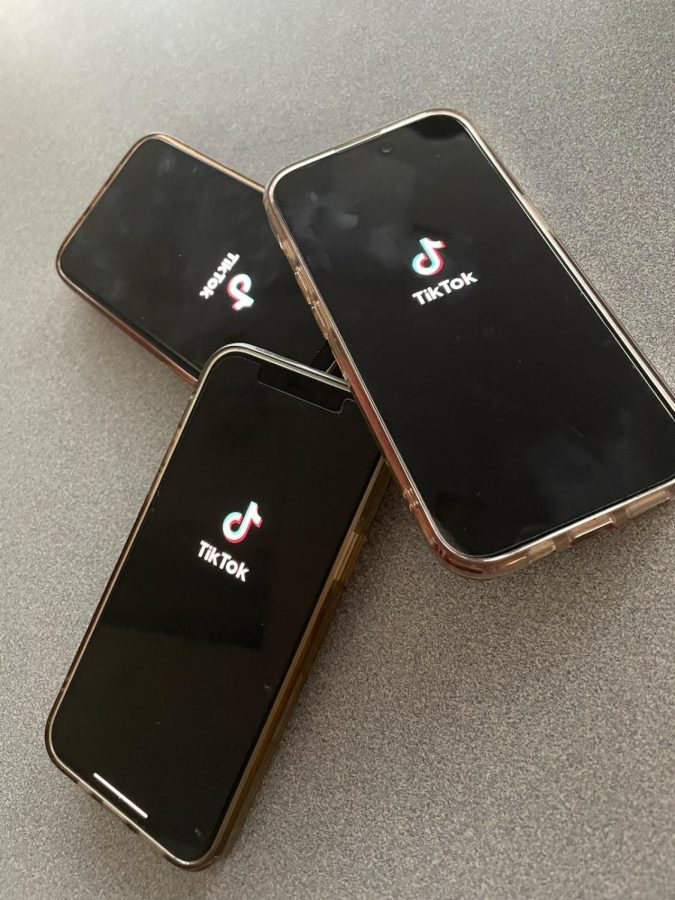Is TikTok Getting Banned?
April 26, 2023
TikTok is a social media platform in which its 150 million users can create and share short videos on a variety of topics, such as makeup tutorials and cooking lessons. The popular video-sharing app is currently denying claims that its parent company, ByteDance, would share private user data with the Chinese government, push propaganda, and spread misinformation. These claims are leading the United States to possibly ban Tiktok.
These worries are due to a law enacted by China in 2017, forcing companies to share any personal data relevant to national security. Although there is no proof that ByteDance has handed over any information, fears, and suspicions are still present.
In December of 2022, concerns escalated when a report about ByteDance was leaked causing four employees to be fired for accessing data on two journalists from Buzzfeed News and The Financial Times while attempting to track down the leak. Further proving that these kinds of information leaks are entirely possible.
Although these concerns are present, any action the U.S. takes to attempt to ban Tiktok, ByteDance will have loopholes for users to continue accessing it. However, the Committee on Foreign Investment in the U.S. has already threatened a ban on the app unless Chinese investors let go of their stakes in the company.
While some are afraid of their favorite app being taken away, some support banning TikTok. However, gaining the political power to enact the ban will be difficult.
Evan Greer, director of the nonprofit advocacy group Fight for the Future, stated, “If policymakers want to protect Americans from surveillance, they should advocate for a basic privacy law that bans all companies from collecting so much sensitive data about us in the first place, rather than engaging in what amounts to xenophobic showboating that does exactly nothing to protect anyone.”
If the ban does fall through, many other free speech groups will speak out about this issue.
Last month, the White House came out with a statement giving U.S. Federal Agencies 30 days to remove TikTok from all government-issued mobile devices.
Outside of the U.S. , British authorities stated on Thursday that they are banning TikTok on government-issued phones on security grounds. While the European Union’s executive branch temporarily banned TikTok from employee phones. Denmark and Canada announced efforts to do the same.
According to New York Times, Montana was the first U.S. state to ban TikTok in March 2023; however, it will take effect in January of 2024. This ban would place a $10,000 daily fine on TikTok and any app stores that allow citizens of Montana to continue to use the app.
This decision has enraged users of the platform, as it is a violation of the right to free speech. However, public protest and possible legal action from TikTok could reverse this bill, while it is still in the process of being fully implemented.
Besides the issue of leaked information, TikTok can be addictive and bad for your mental health, says Samantha Murphy Kelly, from CNN. Their 15-second videos can keep you engaged for hours. TikTok uses an algorithm to gather what captivates and interests you, curating an array of videos, and keeping you on the platform longer.
Studies have shown that spending prolonged amounts of time on TikTok can lead teenagers into depression and mental health problems. An article by Kelly states, “TikTok may surface potentially harmful content related to suicide and eating disorders to teenagers within minutes of them creating an account.”
A report from Imran Ahmed, CEO of the Center of Countering Digital Hate, states, “…young people’s feeds are bombarded with harmful, harrowing content that can have a significant cumulative impact on their understanding of the world around them.” Why is action not being taken to prevent TikTok from damaging the generations of our future?
Our very own English teacher here at Wheat Ridge, Meaghan McDowell–a TikTok user herself, said of the app, “…[TikTok can] bum me out sometimes because sometimes an unrealistic lifestyle is projected on there, and I think that all of us can get stuck in that.”
While some people who create videos may rely on TikTok to support themselves, banning TikTok may do other people a lot of good.

